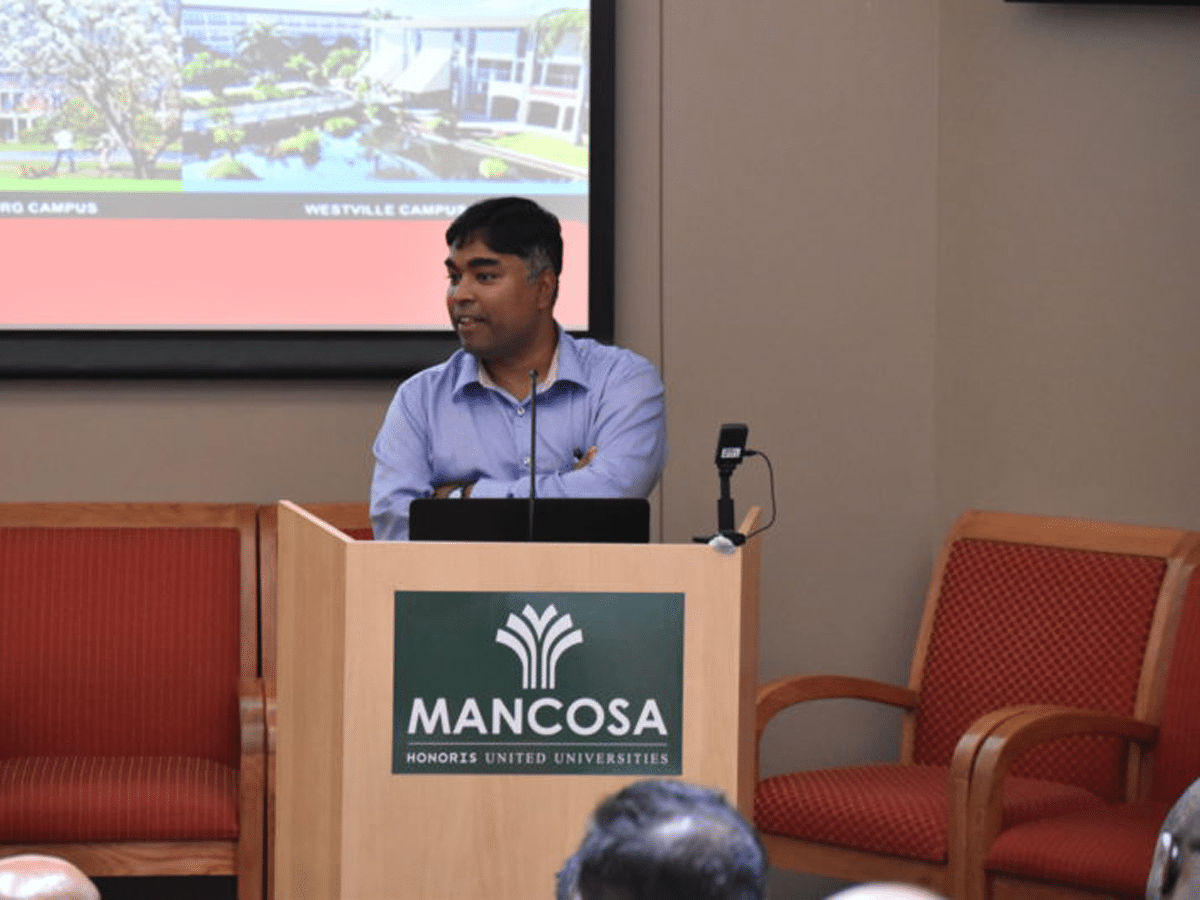2017 National Research Conference on Business, Management and Sustainable Development: Emerging Opportunities and Challenges
On 7th December 2017, the Management College of Southern Africa (MANCOSA) and REGENT Business School jointly hosted a one day National Research Conference on Business, Management and Sustainable Development. The focus was on emerging opportunities and challenges.

Deputy Mayor, Councillor Fawzia Peer presents a Keynote Address at a National Research Conference jointly hosted by two of the leading private, business and management higher education institutions in Southern Africa – The Management College of Southern Africa (MANCOSA) and REGENT Business School, on 7th December 2017 in Durban, South Africa. Both institutions are now part of Honoris United Universities, the first pan-African private higher education network seeking to develop the next generation of African leaders through education for impact.
We only have ONE PLANET EARTH. There is no planet B.
On 7th December 2017, the Management College of Southern Africa (MANCOSA) and REGENT Business School jointly hosted a one day National Research Conference on Business, Management and Sustainable Development. The focus was on emerging opportunities and challenges.
The theme of the Conference ‘Business, Management and Sustainable Development: Emerging Opportunities and Challenges’ underpinned the need for collaboration and cooperation of all delegates attending the conference.
The Conference Programme was rich and varied with a keynote address and fifty paper presentations across three sessions– not forgetting the teas, a lunch and a Banquet Dinner. The event was a success in every respect and the organising committee members, who had all worked extremely hard for the details of important aspects of the conference were commended.
The Conference offered a platform for scholarly and applied conversations among a wide variety of stakeholders concerned with the continual challenge of advancing the sustainable development and business agenda: people, planet, and growth. Because this is an emerging paradigm, there is much research and exploration that is needed. Academics, researchers, and professionals shared their findings and learnt from each other, in order to facilitate the transformation in how economic activity is conducted, allowing human societies to be sustained and to thrive.
In her Keynote Address, Councillor Fawzia Peer, the Deputy Mayor of eThekwini emphasised the Principles for Responsible Management Education (PRME), an initiative by the United Nations Global Compact which is a collaborative, collegial learning community that thrives on sharing good practices to inspire and champion responsible management education, research and thought leadership globally. Successful implementation of the United Nations Sustainable Development Goals (SDGs), she empahsised, will require all players to champion this agenda and the role of higher education is critical to this. She also stressed that the SDGs are relevant for business and management schools. Higher Education Institutions have the ability to influence students with responsible and sustainable business practices. This influence shapes tomorrow’s business leaders and society
She further stated that whilst government plays a key role in advancing the goals, it is business that will be instrumental in the success of the individual targets through the way they operate, develop new
business models, invest in communities, innovate, and collaborate. For companies, successful implementation of the SDGs will strengthen the enabling environment for doing business, minimising increasing risks while also providing a myriad of new opportunities. As such, she indicated that it is business schools who will play an even more crucial role in the successful implementation of the SDGs.
Finally she reminded the delegates at the conference that it is imperative that we all remember we only have ONE PLANET EARTH. There is no planet B. She exhorted the house to do whatever is necessary to sustain our planet, ourselves, our children and their great, great, great great, great grandchildren. “We owe it to the future”, she said.
As the fields of sustainable development and business and management cross over into multiple areas and disciplines, delegates presented a range of topics and perspectives. The range of research submissions included conceptual, empirical, experimental, and case studies. In particular, papers made empirical and theoretical contributions about the social and economic processes impacting on sustainable development; business and management; global environmental governance, business and public policy approaches; technological innovations; climate change adaptation & mitigation; renewable energy development.
During the conference, it emerged that in order to achieve transformation towards a more sustainable world, the main political, economic and societal actors are looking for global solutions to face the global climate change which is perceived as the most important issue of our time. An ever increasing number of regions, sectors, ecosystems and social groups are confronted in the same time by the impacts of climate change on future societal transformation.
Chair of the conference organising committee and Associate Director for Research at Mancosa [GSB], Mr Paresh Soni, indicated that the outcomes of deliberations suggested that we should encourage any type of multi-, inter- or transdisciplinary studies and practices linking disciplines, knowledge systems and stakeholders to help the world to reach the sustainable development goals. Towards this end, a variety of conceptual and empirical submissions, drawing on a range of theoretical perspectives and diverse methodologies (case studies, in-depth issue studies, speculative analyses) were used. Soni went on to say that the overall outcomes of this National Conference were of great interest to a wide variety of stakeholders, including: researchers, scientists, experts, policy practitioners, business decision makers and industry experts who were committed toward more sustainable business and management practices. He also thanked delegates for their unique and interesting contributions in making the event an outstanding success.





